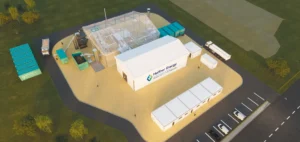The EIB (European Investment Bank) and Repsol sign a €120 million loan agreement in Spain.
A circular economy
The ISB grants a €120 million loan to Repsol for the development of the first advanced biofuels production plant. It will be located in Cartagenene in the region of Murcia. The plant will produce second generation and advanced biofuels from different types of waste.
The waste will come mainly from the food industry, such as used cooking oil. Thus, the project is part of a transition process towards a more circular economy. In addition, construction began in March and is expected to be completed in the second half of 2023.
Second generation biofuels are derived from a wide range of biogenic residues. In fact, they come from used cooking oils, certain animal fats and vegetable oils. They cannot be used as food and come from crops that do not compete with food.
These biofuels are a sustainable solution for all segments of mobility. They are a solution for those who have no other alternative to decarbonize their activity, such as maritime transport.
Progressive decarbonization
Biofuels can reduce net CO2 emissions by 70% to 90% compared to the traditional fuels they replace. ISB funding will also support research programs on advanced biofuel technologies. Thus, the European bank will support the research underway at Repsol’s technology laboratory in Madrid.
The production plant will be located in the Repsol industrial complex in Cartagena. The plant will process 300,000 tons per year (tpa) of lipid residues. The site will be able to produce up to 250,000 tpa of biofuels for the transport sector.
ISB Vice President Ricardo Mourinho Felix says:
“The ISB is committed to financing green transformation, the use of alternative energy sources and innovative research programs across Europe. The ISB loan contributes to Repsol’s strategy to transform its business model and its decarbonization strategy. We are pleased to work with companies like Repsol that are taking steps to decarbonize business activity and build resilience to climate change.”
Furthermore, the project is aligned with the European Green Deal and the Fit for 55 package and will support energy security. Indeed, the European Union is seeking to reduce its dependence on imported fossil fuels.
Repsol was allocating €6.5 billion to low-carbon initiatives in 2021-2025 (35% of total investment). The company is committed to achieving net zero emissions by 2050. The company wants to reduce the carbon intensity indicator by 15% by 2025, 28% by 2030 and 55% by 2040.






















